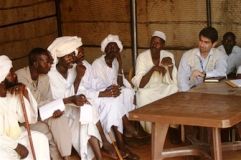Aid workers in Darfur persevere against violence
Oct 4, 2006 (EL SALLAM CAMP) — Tribal leaders gathered in tense silence in a straw hut at Darfur’s El Sallam camp, facing international aid workers who’d come to broker an agreement between the refugees and a Sudanese aid group that residents wanted to bar from the camp.
 Clad in flowing white cotton robes and turbans, the tribal leaders gave a long list of reasons to prevent aid workers from Siha, a Sudanese non-governmental organization, from coming anywhere near the camp.
Clad in flowing white cotton robes and turbans, the tribal leaders gave a long list of reasons to prevent aid workers from Siha, a Sudanese non-governmental organization, from coming anywhere near the camp.
“How can we trust that they aren’t spies for the government,” said one representative of the refugees Wednesday, recalling that the Sudanese army had chased his people from their villages more than two years.
Some 80,000 refugees survive in El Sallam and the nearby camp of Abu Shouk, a cluster of huts, mud brick houses and tents that sprawls on the outskirts of the capital of North Darfur state, El Fasher. They are among 2.5 million people made homeless by three years of fighting between Khartoum and rebel groups in the vast, arid Darfur region of western Sudan.
At least another 200,000 people have been killed since hostilities erupted, and though in May the government signed a peace agreement with one faction of rebels, pro-government militias and rebel factions continue to harass, rob and rape refugees.
The United Nations says humanitarian access is nearing an all time low. With 13 aid workers killed in recent months, the U.N.’s humanitarian chief warned that international aid groups would have to pull out if security worsened.
Humanitarian workers in Darfur, however, all say they’ll hang on. Only if the fighting makes it impossible for them to operate at all will they consider leaving.
International aid groups have withdrawn from large sections of Darfur, and now often drive or fly in and out on spot missions to deliver medicine and equipment to local aid workers.
Earlier this week, aid agencies visited the North Darfur rebel town of Dar Essallam, about 60 kilometers (40 miles) south of El Fasher, to deliver some US$1,000 (A790) in medicine and a solar-powered fridge to keep it in.
There were other villages to visit, but they only stayed a few minutes. Two Health Ministry workers had been brought along to help. They nervously unloaded the supplies in the rebel stronghold.
“They’re not risking anything, people know who’s helping and who’s fighting,” Isaac Ardia, the clinic manager said. Ardia, himself technically a government employee, said he had no problems living among the armed rebels. He belongs to the same tribe as rebel chief Minni Minawi, and said ethnic ties run deeper than politics. “All my family is in the rebellion, I can do what I want,” the government worker said.
Ardia recalled that 150 wounded rebels had recently arrived in Dar Essallam after receiving first aid treatment in Libya. “I told them to get out of my hospital; it’s a civilian clinic here.” Though Libya has long been rumored to support Darfur’s rebels, his claim couldn’t be independently verified, and the international aid workers were in a hurry to move on rather than look for wounded fighters.
With hatred and suspicion festering for years, armed fighters aren’t the only danger. Refugees in the volatile camps may also pose a threat to aid workers _ especially if the workers are Sudanese.
Three Sudanese water engineers were murdered in the South Darfur camp of Zalingei in June because refugees suspected they’d come to poison their wells rather than fix them.
Of 15,000 humanitarian workers in Darfur, only 1,000 are foreigners. International aid groups are pushing for homegrown organizations to take over long-term relief.
The U.N. Children’s Fund, which operates the water sanitation project in Zalingei where the engineers were slain, was eager to obtain full acceptance from El Sallam’s refugee leaders on Wednesday before bringing in the Sudanese workers.
“We don’t believe in doing everything directly, it’s much better over the long term to have Sudanese help other Sudanese,” said Sardar Dohuki, a UNICEF worker from Iraq who was handling introductions in El Sallam.
The Sudanese Siha NGO holds workshops for female victims of violence and rape. But El Sallam’s 20 representatives _all men_ first said they wanted none of it. Sudanese aid groups are all government stooges, they said.
“I can assure you that our only agenda whatsoever is to achieve our aid program,” said Siha worker Najad Buchra at the end of lengthy, but successful negotiations.
A camp manager from the International Relief Committee (IRC) promised he would oversee Siha’s setting up and the refugee leaders eventually agreed on a long list of conditions under which the group could operate.
“For the sake of sustainability, it’s a good step forward,” Dohuki, of UNICEF said. The Sudanese group would be more effective in getting its message across with the refugee women than a foreign aid group, and would operate on a smaller budget, he said. “Who knows how long international workers will be here.”
(AP/ST)
